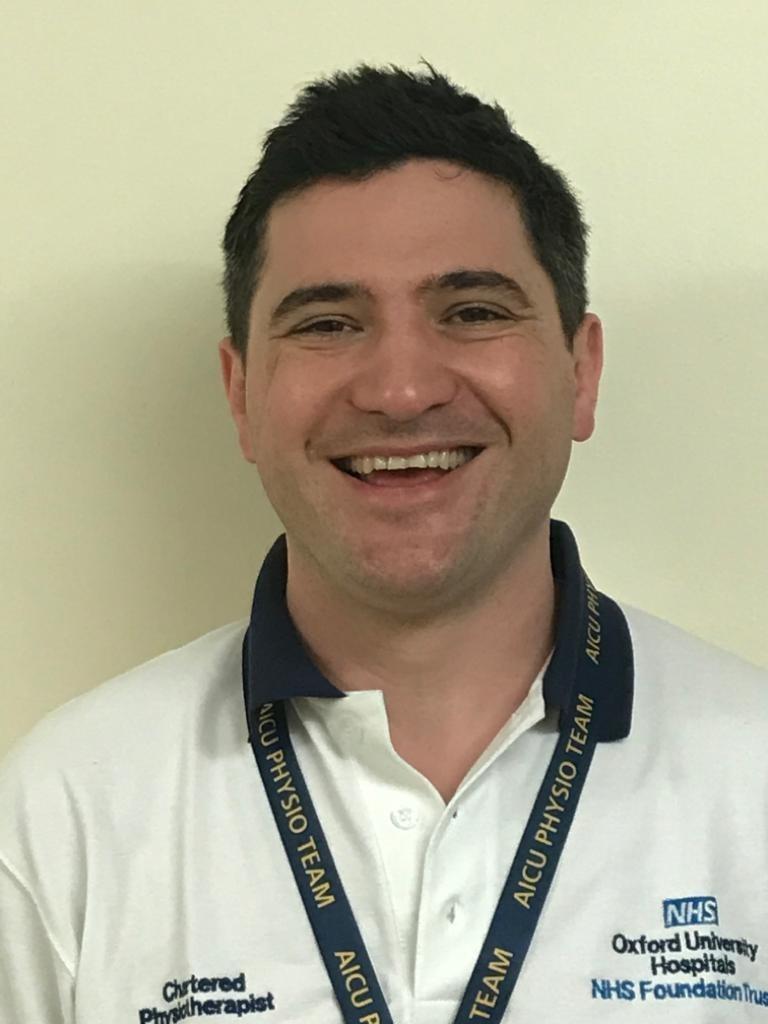A physiotherapist who works with patients in the Adult Intensive Care Unit at the John Radcliffe Hospital has become the first physio working clinically at Oxford University Hospitals to receive funding from the National Institute for Health Research (NIHR) to study for a PhD.

Owen Gustafson (pictured), OUH’s lead physiotherapist for the AICU, has been awarded an NIHR Clinical Doctoral Research Fellowship, and is due to start his PhD in April.
Owen’s time is normally split between research and clinical work, but in the last 12 months, he has been almost entirely working on the COVID-19 ICU at the John Radcliffe.
Owen’s research interest is in is the long-term outcomes and physical function of patients leaving ICU: “What my project is going to look at is the musculoskeletal complications encountered by these patients following a period of critical illness. I ran a post-ICU rehab class, and picked up a lot of unexpected shoulder problems, and I looked at that for my master’s research.
“There’s not enough conclusive research on how best to provide physical rehab to ICU survivors after they’ve left hospital, so we need to look at the problems they are encountering in more detail. My project aims to look at what the musculoskeletal health is of these patients, what problems they encounter and have an in-depth look at how that affects them functionally.”
Owen’s award is for three years, and the NIHR covers all his research and training costs.
The NIHR’s Integrated Clinical Academic Programme provides research training awards for health and social care professionals, excluding doctors and dentists, who want to develop careers that combine research and research leadership with continued practice and professional development.
“This is massive for me. It gives me the freedom for three years to really concentrate on developing myself as a clinical academic, with a plan to apply for clinical lectureships at the end of it,” Owen explains.
The fact that Owen’s costs are being met by the NIHR means OUH’s Therapies Department will get his salary for three years to replace him for that period, so that he does not get pulled back into his substantive role.
As part of the award, Owen will spend 80 percent of his time undertaking research and 20 percent on clinical work – but this 20 percent is in addition to the department’s regular staffing.
“As part of the award, you have to have a clear clinical training programme, as well as a research training programme – you have to develop both hand in hand.
Owen, who will study at the Centre for Movement, Occupational and Rehabilitation Sciences at Oxford Brookes University, is full of praise for the support shown by the head of his Therapies Department, Terry Cordrey, who is aware that NIHR-supported research is expected to translate to patient benefit within five years of the research being carried out.
For this reason, he believes it’s important that more nurses, midwives and allied health professionals (AHP) undertake clinical research: “This is an academic centre, so we all know how research benefits patients. But within therapies, and among AHPs and nurses, the number of clinical academics is really small.
“My clinical background – and the fact that I’m working clinically while undertaking research -means that I really understand the problem. In seeing the problems, I can generate research questions more easily and find benefits that are applicable. So from a nursing, midwifery and AHP point of view, it’s really important to get clinical academics,” Owen explains.
Owen follows AICU sister Jodie Ede, who last year became the first OUH nurse to receive an NIHR Clinical Doctoral Research Fellowship.
He says: “There are now people like Jodie and me, who are going through the process and who can advise NMAHPs about how to forge a clinical academic career and it will hopefully make it more straightforward.”